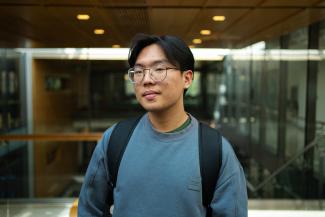Understanding Christian Retreats—Tim's Story

“I actually had confidence that I could take what I learned from Mark Camp and move it beyond Mark Camp,” Tim Sung, a soon-to-be sophomore at the University of Washington, said.
For countless InterVarsity students and alumni across the country, Mark Camps have been transformative experiences over the years. At the end of the semester, students gather for a week of Bible study, worship, being in nature, sharing meals, and enjoying community. For Tim, Mark Camp changed his understanding of Christian retreats and what it looked like to follow Jesus longterm.
Relying on Spiritual Highs
Tim’s parents met Christ in 2007 when he was still very young. He grew up in church, where he regularly attended retreats with his youth group. At those retreats, Tim would always experience what he calls spiritual highs — temporary feelings of excitement about his faith. But, unfortunately, "that feeling faded soon after,” he said, “as if the lessons I learned from those retreats didn’t matter.”
When Tim decided to go to Mark Camp as a freshman with his InterVarsity chapter, he expected the same kind of experience: a spiritual high soon squashed by the lulls and lows of everyday life. But what he got was something entirely different.
“Mark Camp was the first retreat I could think of where I wasn’t directly taught any specific message or lesson,” Tim said. “I was simply learning to study the Bible.”
Studying Scripture and Seeking God
At first, the idea of studying the Bible for eight hours a day at a camp didn’t sound appealing to Tim. But as Mark Camp progressed, he started feeling as though each Bible study went by too quickly. He was surprised that he actually enjoyed studying the Bible and approaching it with curiosity. He was given the space and the tools to find answers to his questions in Scripture.
Tim reflected on how previous camps and church contexts he had been in were centered around a pastor or older adult telling him answers or what to do. “But receiving answers without knowing how to get [them] or apply them can only get you so far,” he said.
Mark Camp also showed Tim that it was okay to have questions in the first place. He learned to accept that not everything was going to make sense on first read, and that was okay. The process of reading Scripture and seeking God through it, even through confusion and doubt, was worthwhile.
Sustaining Soil
One passage that stayed with Tim was Mark 4:2-8.
He taught them many things by parables, and in his teaching said: “Listen! A farmer went out to sow his seed. As he was scattering the seed, some fell along the path, and the birds came and ate it up. Some fell on rocky places, where it did not have much soil. It sprang up quickly, because the soil was shallow. But when the sun came up, the plants were scorched, and they withered because they had no root. Other seed fell among thorns, which grew up and choked the plants, so that they did not bear grain. Still other seed fell on good soil. It came up, grew and produced a crop, some multiplying thirty, some sixty, some a hundred times.”
At Mark Camp, Tim confronted the soil that his faith was rooted in. He realized that relying on spiritual highs and weekend retreats to experience God was weak soil. But good soil was sustaining. Studying Scripture humbly and vulnerably, and experiencing God through the exciting retreats and the monotony of daily life, was what good soil looked like.
Now, Tim has what he needs to continue pursuing his walk with Jesus throughout the rest of his time in college — and beyond.






